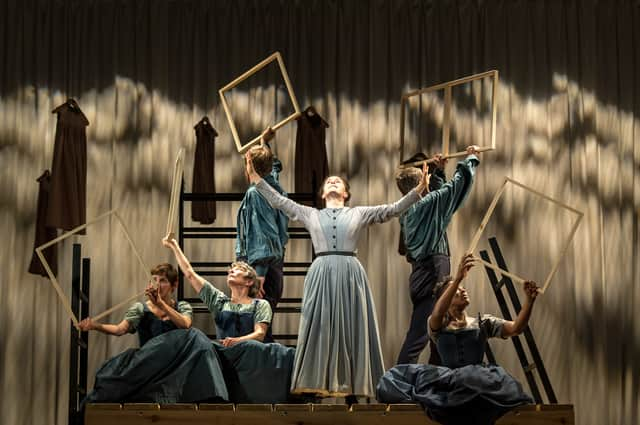THEATRE REVIEW: Jane Eyre


Jane Eyre
Sheffield Lyceum until Saturday, April 22
by Phil Turner
CHARLOTTE Bronte’s 1847 novel Jane Eyre is usually portrayed as a brooding love story set against the backdrop of a mad woman in the attic.
But it is really the story of a very modern woman.
As Jane says: “Women feel just as men feel — they need to exercise their faculties.”
Advertisement
Hide AdAdvertisement
Hide AdDirector Sally Cookson, like the character Jane, conveys the unjustness of inequality in this stunning recreation.
It was devised by the original National Theatre company at Bristol Old Vic and blows away the Victorian cobwebs to get to grips with the social upheaval of the times in which Bronte was writing.
The atmosphere is set by Michael Vale’s design which uses a background of white curtains and a wooden platform, suggesting houses by floating window frames and ladders.
The unfairness and cruelty suffered by orphan Jane in early life is vividly depicted.
Advertisement
Hide AdAdvertisement
Hide AdThe red room in which she is locked is evoked with a flood of scarlet light. Later, real flames flicker up the stage as Rochester’s house burns.
Benji Bower's music — expertly performed by Matthew Churcher, Alex Heane and David Ridley — complements the rich mezzo notes of Melanie Marshall, who stalks the stage as Bertha Mason, Rochester's first wife, the “mad woman in the attic”, who is here given her own voice.
Singing Mad about the Boy works wonderfully well.
Nadia Clifford is totally convincing as Jane, going from child to adult as sturdy and strong as her Lancashire accent, raging against the injustice of it all while displaying the right amount of vulnerability.
Tim Delap’s Rochester displays wit and intelligence, a man changed by the cruel world around him — very much like adventurer Delaney in the recent Taboo TV series.
Advertisement
Hide AdAdvertisement
Hide AdThe rest of the actors play several roles. Hannah Bristow runs about endearingly as Rochester’s ward Adele and movingly portrays tragic schoolgirl Helen Burns.
Paul Mundell is captivating as Rochester’s dog, slapping a leather strap for his tail.
Lynda Rooke perfectly captures the warmth and affection of housekeeper Mrs Fairfax and the cruelty of an unbending Mrs Reeve.
Evelyn Miller revels in the roles of Bessie and St John.
“It’s a girl,” are the first and last words uttered by the whole cast.
A clever device to demonstrate, as Cookson says, a clarion call for equal opportunities.